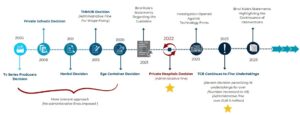No-poach, no problem: Recent Developments in the Labour Markets – A Comparative Analyses

No-poach, no problem: Recent Developments in the Labour Markets – A Comparative Analyses
“Masters are always and everywhere in a sort of tacit, but constant and uniform combination, not to raise the wages of labour above their actual rate… We seldom, indeed, hear of this combination, because it is the usual, and one may say, the natural state of things, which nobody ever hears of. Masters, too, sometimes enter into particular combinations to sink the wages of labour even below this rate…” (Adam Smith – Wealth of Nations, 1776)
I. Introduction
Antitrust issues in labour markets haven’t been flagged as a high-priority area for enforcement until late 2010’s. Even though competition law is applicable without any limitation in all product and service markets, especially the Turkish Competition Authority (“TCA”) and competition authorities in the European Union (“EU”) had kept their distance away from these markets for a while. Having received increased attention all around the world, this issue now occupies the attention of regulators worldwide to address anticompetitive behaviour by employers in labour markets. Following the trend started by the United States, labour markets is in the radar of the European Commission (“Commission”) too; whereas similar decisions from regulators worldwide are published and solid steps are being taken in Portugal, France, Germany, Belgium, Lithuania, Switzerland, Greece, United Kingdom; as well as Canada, Peru, Japan, and China. No-poach agreements are also at the top of the TCA’s agenda nowadays. Indeed, the Turkish Competition Board (“TCB”) has just stepped-up its crackdown on no-poach agreements by fining 16 companies, including Turk Telekom, Vodafone, Hepsi Burada, Çiçeksepeti, Zomato etc. over €5 million for agreeing not to hire each other’s employees. Considering TCA’s President Birol Küle’s recent speech on this issue[1], it is safe to assume that addressing anticompetitive behaviour by employers in the labour markets will continue to occupy the regulators agenda in the upcoming days. In this article, we will discuss this topic in the light of recent developments in Turkey and all around the world.
II. The TCB’s Approach to Labour Markets in Turkish Competition Law
The Turkish competition legislation, different from some other legislations, does not have clear provisions on the labour markets and collective bargaining processes. Besides, some academicians interpret the preamble of the Law No. 4054 on the Protection of Competition (“Law No. 4054”) as there is an exception foreseen to the labour markets; on the grounds that the concept of “services” is defined as “Physical, intellectual or combined activities carried out in return for a cost or interest” in the Law No. 4054 whereas the preamble of the said clause sets forth that “Undoubtedly, the labour market, where the collective bargaining is accepted, is outside of this definition”. However, some authors in the doctrine also emphasize that since the relevant text stresses not only “labour market” but instead, “labour market where the principle of collective bargaining is accepted”; rather than excluding the agreements concluded between employers where the labour is bought and sold from the scope, the main purpose is to exclude concepts similar to collective bargaining agreements, which are based on collective bargaining processes.[2] The TCB on the other hand, clarified the said debate with its Container Drivers decision, by setting forth that the preamble of the relevant clause does not aim to immunize the agreements between undertakings that are concluded on the labour markets. [3]
Although TCA’s decision-making body the TCB, has been issuing related decisions since 2005, it did not consider the topic as an essential subject of the competition law until recently. Indeed, until 2022, TCB did not impose any administrative fines on undertakings for competition law violations in such markets. The TCB’s tolerant approach was changed with its Private Hospitals decision[4]. By 2023, TCB’s rigid interpretation of the topic has been clarified as a result of the fully fledged investigation which resulted in imposing administrative fines of more than €5 million on 16 undertakings.
- Recap of the TCB’s Precedent Until the Decision Dated 2023
In the early 2000s and 2010s, there were several cases rendered in the labour markets, the first precedent being in 2005. Considering that the assessments and judgements rendered significantly vary between the periods between 2005 and 2021 and 2021 and onwards, precedents in the said periods will be separately evaluated.
Early Decisions of the TCB [2005-2021]
The TCB has adopted a more tolerant approach between 2005 – 2021 as opposed to its current stance. Indeed, 6 decisions that are rendered between the relevant years can be considered as more flexible since, apart from one of them, the TCB did not impose any administrative monetary fines to the relevant undertakings even though the relevant allegations were found to be in violation with the Law No. 4054.[5] Amongst the said decisions, even though there was enough evidence to prove the establishment of agreements, and the violation was established, the TCB decided to send a written opinion to the relevant undertakings, as per Article 9/3 of the Law No. 4054.[6]
⇛ TV Series Producers decision[7] – 2005: The TCB’s first decision on the matter concerns a preliminary investigation launched against relevant TV series producers on the allegation that the said parties have entered into no-poach and wage fixing agreements. Although not turned into an investigation due to the lack of evidence, the TCB have emphasized that wage fixing is considered as price fixing; and this precedent paved the way for evaluations in some other precedents where such agreements are considered violation by object.
⇛ Private Schools decision[8] – 2011: Similar to TV Series Producers decision, the TCB did not turn this preliminary investigation into a fully-fledged investigation. Nevertheless, it is concluded that negotiation and information exchange on wages, salaries and scholarships does constitute violation of the Law No. 4054.
⇛ Henkel decision – 2011: Having investigated the allegation of a no poach agreement between chemical manufacturers, the TCB maintained its tolerant approach, and ruled that certain no-poaching agreements concluded in sectors where technical information and innovation is important, may benefit from the exemption mechanism.
⇛ Bfit decision – 2019: Amongst other precedents rendered between the relevant period, this decision stands out both regarding the detailed effects analyses conducted, as well as being one of the few decisions where no poach clauses are evaluated as ancillary restraints, other than merger cases. TCB evaluated that no poach clauses in the franchise agreements concluded and decided that such clauses cannot benefit from the exemption mechanism and that the relevant agreements constitute a violation of the competition law. Having said that, the TCB also conducted a detailed effects analysis, and decided only to send a written opinion to the said undertaking, setting forth again, its tolerant approach on the issue at hand.
⇛ Union of Chambers of Turkish Engineers and Architects decision (UCTEA decision)- 2019: The only decision where TCB imposed monetary fine on the undertaking concerned between 2005 and 2020 is the while evaluating that since the evidence obtained explicitly reveals an agreement, the standard of proof is established, the TCB ruled that the fact that the chamber of engineers have fixed wages without statutory power, violated the Law No. 4054.
⇛ Aegean Container Transporters decision – 2020: As it did in its first precedent in 2005 on this topic, in this decision the TCB again emphasized that wage-fixing agreements and price fixing agreements do not have a fundamental difference. It is also noted that the wage-fixing/no-poaching agreements are no different from cartels established at the buying side of the market. Like other precedents in this period, while stating that no-poach agreements may be considered as violation by object, the TCB also underlined that effects analyses can be conducted for restraints on labour markets for legitimate collaborations or agreements. As a result, considering that the limited effect of the agreement, only written opinion is sent to the relevant undertakings.
- Breaking Point for the TCB’s Approach
The TCB’s Private Hospitals decision[9], marks a milestone in the TCB’s precedent on this topic, where effects analyses are completely left behind and the regulator takes a stance to clamp down for agreements that interfere in labour markets; opening up fully-fledged investigations and imposing administrative monetary fines on the undertakings concerned. Indeed, in the said decision, where among others, the allegation that some private hospitals are preventing personnel transfer is examined, it is underlined that that non-poaching and wage-fixing agreements restrict competition by object and that an effect analysis is not required. As a result, the TCB imposed administrative fines on the 18 private health institutions and 1 association of undertakings based on several reasons such as limiting competition in labour markets, price fixing and exchange of competitively sensitive investigation.[10]
- The TCB Continues to Fine Undertakings for No-Poaching Agreements
The most comprehensive investigation launched by the TCA, which initially started against 32 undertakings and the scope was expanded, number increased to 49 undertakings; concerns no poaching agreements between leading undertakings from various sectors, as communication, media, e-commerce, food and retail.[11] At the press release, president Birol Küle highlighted that the agreements in labour market decrease labours’ mobility and welfare and the essential purpose of the interventions is to protect the competitive structure of the labour market; and signalled that a guideline was going to be published.[12] As a result of the investigation, amongst 49 undertakings, the TCB imposed fines on 16 undertakings over €5 million in total. Even though the reasoned decision is not published yet, the following is noteworthy:
- Significant evaluations on the non-poaching agreements: The TCB, evaluated that the non-poaching agreements to be considered as violation by object, labelled them as a cartel and imposed administrative fines on the relevant undertakings accordingly.
- Labour market boundaries are being reshaped against product markets: Considering that the product markets often have boundaries that do not match up in a consistent manner with the labour market boundaries, the TCB based its evaluations on the employee market in the decision. As a result, despite not being competitors in the product market, the investigated undertakings are penalised for entering a cartel.
- Ancillary restraint defences not accepted: The ancillary restraint defences, which are particularly accepted in the USA, and which were also referred to in the above-mentioned Aegean Container Transporters decision, are not accepted. The TCB rules that, even if there is legitimate cooperation between undertakings in a vertical relationship, non-poaching agreements are still considered as an infringement. That being said, during the oral defences, it was understood that a criterion of ancillary restraints, i.e., existence of a written agreement between the undertakings concerned which was also underlined in the investigation report, was not met, since there were no written agreements concluded between investigated parties. In any case, since the reasoned decision has not been published yet, it is still not crystal clear whether the Board will in any way may consider such agreements as ancillary restraints.
- Former employees are also included within the scope: The TCB interprets the employee concept broadly and underlines that not only the no poaching agreements which concern current employees but also the ones that include provisions to not to employ former employees also constitute a non-poaching agreement.
- The standard of proof kept considerably low, compared to previous precedents: The TCB, used to keep the standard of quite high in its former decisions on this issue, and did not impose any administrative fines to the relevant undertakings between 2005 and 2021 – except its UCTEA decision in 2019 where an explicit agreement was established – now seems to break this trend. In this decision, monetary fine imposed even to an undertaking only based on dateless 3 pieces of evidence.
- Explanations regarding the calculation of the fines: The TCB accepted defences that the fines should be based on turnover in the relevant product market. Furthermore, due to the postponement of the oral defence due to the earthquake happened in Turkey in February 2023, the Board based its fine calculations on the gross revenues of the undertakings at the end of the fiscal year 2021, not 2022.
III. A Truly Global Trend
As the TCB increased its attention on the labour markets, so does other competition authorities around the world. Becoming truly a global trend now, anti-competitive behaviour became the subject of discussions in the OECD’s roundtable in 2019. Highlighting the important role competition law enforcement has in addressing anticompetitive behaviour in these markets, the OECD has led the way in discussions on this topic. In this section, a recap of global developments from the USA to Europe and other countries will be presented.
1. United States

United States, where the labour markets have been a priority for antitrust enforcement as of the Sherman Act dated 1980, it the country that paved the way for increased scrutiny in these markets. Indeed, since 2007, various investigations have been carried out on the matter.
-In 2010, the US Department of Justice sued Google, Apple and several other Silicon Valley tech firms for agreeing not to hire each other’s software agreements.
-In 2016, the Department of Justice (“DoJ”) and the Federal Trade Commission (“FTC”) jointly issued the first guideline on non-poaching and wage-fixing agreements where their comparably more flexible approach is reflected i.e., if the conditions prescribed are satisfied, non-poaching agreements may be classified as ancillary restraint.
-November 2021, for the first time, a federal court held that wage fixing between horizontal competitors can be a per se and criminal violation of the antitrust laws. A year later, in November 2022, in a joint brief submitted the U.S. Department of Justice and the FTC argued that McDonald’s “no-poach” agreements appeared to be unlawful and that the District Court misapplied ancillary restraint doctrine, failing to demonstrate that the relevant conditions are necessary for the pro-competitive effects of the agreements.
-In January 2023, the FTC published a proposal for public opinion to prevent employers from imposing non-competition obligations.
-In March 2023, the US Department of Justice announced that a former HR executive has been charged with fixing the salaries of nurses, and if found guilty of a violation, the individual will be fined and face up to 10 years in prison.
2. Europe
European Commission

The EC has not yet dealt with no-poach agreements in the context of competition law; however, this issue seems to be on its radar. Margrethe Vestager, Executive Vice President of the European Commission and Commissioner for Competition defined non-poaching agreements as a “new era of cartel enforcement”, widening the enforcement focus to buyer cartels, including no-poach agreements. She cited downward pressure on wages and decreased innovation as risks linked to no-poach agreements.
Portugal

In September 2021, the Authority published enforcement guidelines for anti-competitive agreements in labour markets. After 6 months, in April 2022, the Portuguese Football League and 31 football clubs were fined a total of €11.3 million for non-poaching agreements. December 2022, marks the data on which the Portuguese Competition Authority launched an investigation against the Portuguese National Association of Clinical Laboratories and 7 large private laboratory groups for non-poaching agreements.
France

In 2017, the French Competition Authority fined three PVC floor coverings manufacturers for violating competition law by entering into an agreement in relation to their commercial policies, including prices.
-On January 6th, 2023, the French Directorate-General for Competition, Consumer Affairs and Fraud Control of the French government imposed a fine in the amount of € 148,600 on three companies for having agreed in the context of merger to non-compete and no-poach arrangements which the authority deemed to go beyond what was necessary. The President of the French competition authority confirmed that there were more such cases under investigation.
Germany

In 2016, German competition watchdog evaluated that employment related information exchange between three broadcasting companies, violates the German competition law.
Spain

In its decision dated March 2010, Spanish National Competition Authority declared that eight transport freight forwarding agents had breached competition law by agreeing not to hire each other’s employees without prior consent. A year later, it also fined eight cosmetic product manufacturers again for breaching the law through the implementation of a no-poach agreement.
Belgium

Very recently, on August 2, 2023, Belgium also joined the global trend and fined the investigated undertakings on the grounds that they formed cartel through non-poaching agreements.
Lithuania

In 2021, the Lithuanian Competition Authority fined the Lithuanian Basketball League and 10 of its members €40,000 for implementing wage-fixing agreements. In December 2022, the authority fined the Association of Real Estate Brokers and its 39 members a total of close to €1 million for various related violations, on the grounds that the provisions in the Association’s code of ethics constitue a non-poaching agreement.
Switzerland

In December 2022, the Swiss competition authority launched a preliminary investigation into 34 banks for exchanging information on each other’s employees’ salaries, warning that the scope of the investigation could be expanded (geographically or in terms of the number of undertakings involved).
Greece

In March 2022, the Greek competition authority imposed a behavioural measure against the Association of Elevator Installers and Maintenance Specialists of Northern Greece for imposing a minimum wage tariff.
United Kingdom

In February 2023, the Competition and Markets Authority have published guidance to employers on anti-competitive behaviour, marking its first example on providing explicit guidance on labour markets. Up until that date, competition enforcement has been very limited in these markets, however now, the authority is crystal clear in what constitutes anti-competitive behaviour in labour markets: no poaching, wage fixing agreements as well as information exchange.
3. Other Countries
Canada

In June 2022, the prohibition of agreements to fix wages and restrict employee mobility in labour markets was incorporated into competition legislation. The Competition Bureau of Canada, on May 30, 2023, finalized the guidelines on wage fixing and non-poaching agreements.
Peru

Peru’s competition authority fined six construction companies for entering into a non-poaching agreement regarding construction and administrative workers; as well as some HR managers who are also fined individually.
Japan

In 2018, Japan Fair Trade Commission published the Report of Study Group on Human Resource and Competition Policy where it is set forth that an effect analysis for non-poaching agreements can be made.
China

This month, August 2023, China’s four largest pig breeders withdrawn a pledge to not to poach each other’s employees after Chinese antitrust authority summoned them for their “No-Poach Pact”. Although not imposed a fine, this marks the first time that the State Administration for Market Regulation has joined the trend and acted against a no-poach agreement.
IV. Conclusion
No-poach agreements have received increased attention by the competition authorities as a part of a broader movement to address anticompetitive behaviour by employers in the labour markets. Having left its more tolerant approach adopted until 2021, the TCB have also evolved to adopt a more stringent approach towards these agreements and now considers no-poaching agreements being no different from customer/market sharing agreements; and wage-fixing agreements from price fixing agreements. Considering the TCB’s presidents’ recent announcement on August 10,2023 that the authority’s enforcement practices in this market will continue, it is safe to assume that TCB will also continue its increased scrutiny in these markets.
[1] TCB’s president Birol Küle’s press release published by Anatolian Agency on 10.08.2023 is as follows: “When we consider the negative effects of agreements such as wage fixing and non-poaching in the markets, in terms of effects, we consider that these agreements are identical to ‘price fixing’ and ‘customer sharing”.
[2] Competition Law Applications in the Labour Markets, Competition Authority, Thesis of Competition Experts No:192, p. 13.
[3] The TCB’s decision dated 02.01.2020 and numbered 20-01/3-2.
[4] TCB’s decision dated 24.02.2022 and numbered 22-10/152-62.
[5] The TCB’s decision dated 28.07.2005 and numbered 05-49/710-195, The TCB’s Private Schools decision dated 03.03.2011 and numbered 11-12/226-76, The TCB’s TV Series Producers decision dated 07.02.2019 and numbered 19-06/64-27, The TCB’s Aegean Container Transporter decision dated 02.01.2020 and numbered 20-01/3-2, The TCB’s decision dated 26.05.2011 and numbered 11-32/650-201.
[6] Please see the TCB’s TV Series Producers, Private Schools, Aegean Container Transporter and B-Fit decisions.
[7] The TCB’s decision dated 07.02.2019 and numbered 19-06/64-27.
[8] The TCB’s decision dated 03.03.2011 and numbered 11-12/226-76.
[9] The TCB’s decision dated 24.02.2022 and numbered 22-10/152-62.
[10] The TCB determined that 16 undertakings limited competition in labour markets and applied approx. TRY 45 million (EUR 4.3 million when calculated at the average buying rate of exchange of the Central Bank of Turkey in 2021).
[11] The TCB’s decision dated 26.07.2023 and numbered 23-34/649-218.
[12] https://www.rekabet.gov.tr/tr/Guncel/rekabet-kurumu-baskani-birol-kule-isgucu-704d8ab983adeb11812e00505694b4c6 (Last Access: 14.08.2023)




